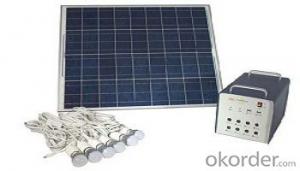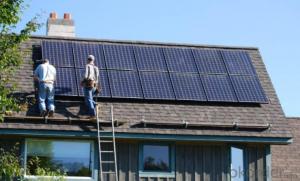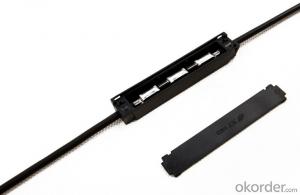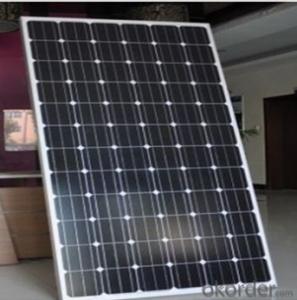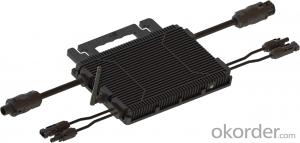TPS-205N 10W Solar wall mount
- Loading Port:
- China Main Port
- Payment Terms:
- TT or LC
- Min Order Qty:
- -
- Supply Capability:
- 50000sets m.t./month
OKorder Service Pledge
Quality Product, Order Online Tracking, Timely Delivery
OKorder Financial Service
Credit Rating, Credit Services, Credit Purchasing
You Might Also Like
TPS-205N 10W Solar Wall Mount Kit
1. 10W Mono Solar panel +12V/7AH Power pack(water resistant cover) + 2pcs 3W LED Lighting with switch +
2pcs USB Charging output (one for iphone and another one for your lamptop)+ 1pcs 12V charging output
2. Working time:more than5 hours for 2pcs LED light, useful for two rooms
3.Mobile phone adapotors and switch wire availbale for power small DC application
Packing Information:
1)1pc*10W Mono solar panel and 1pc*Power pack(metal box)
2)2 pcs 3W LED lights, Switch wire
Outer carton size: 370*165*485mm
Gross weight: 4.9kgs
574 PCS per 20' container
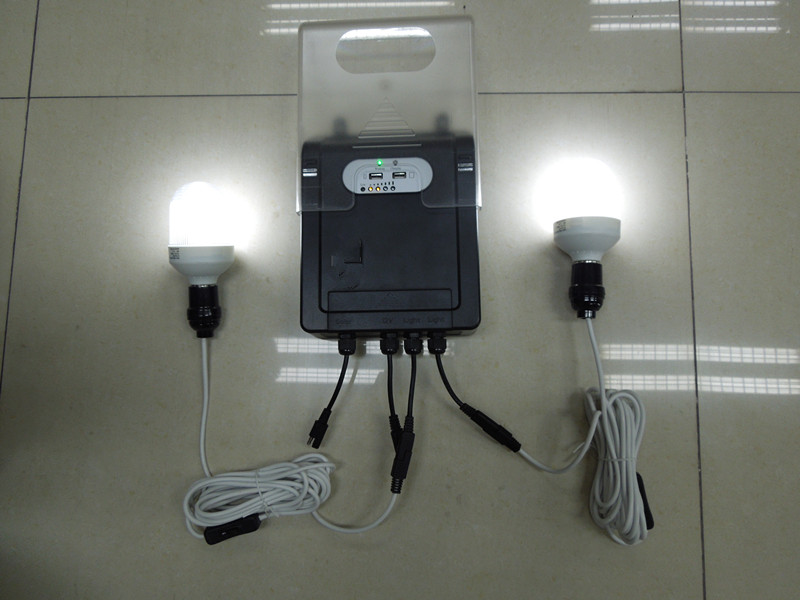
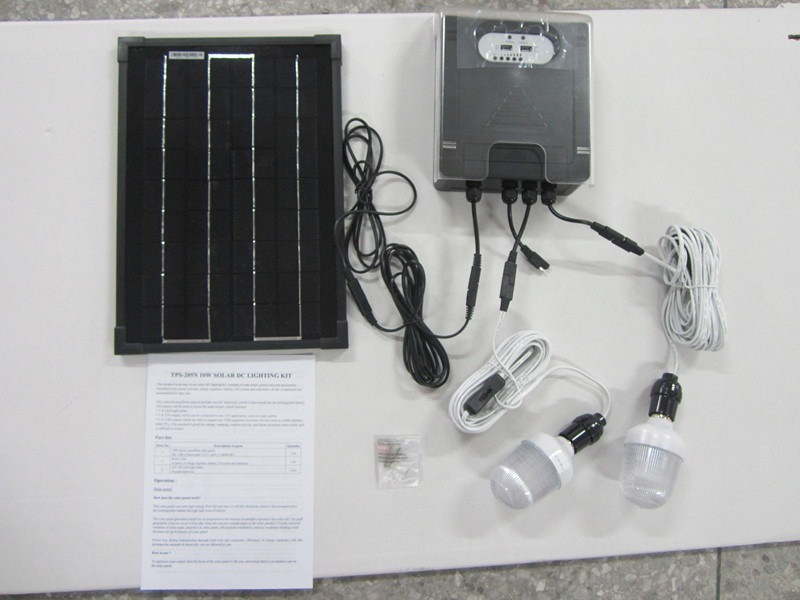
- Q:Can solar energy systems be used for powering streetlights?
- Yes, solar energy systems can be used for powering streetlights.
- Q:Are solar energy systems reliable?
- Yes, solar energy systems are reliable. They have proven to be a dependable and consistent source of renewable energy, with advancements in technology making them more efficient and durable.
- Q:How do solar energy systems impact energy independence in rural areas?
- Solar energy systems have a significant positive impact on energy independence in rural areas. By harnessing the power of the sun, these systems provide a reliable and sustainable source of electricity, reducing reliance on fossil fuels and centralized power grids. This empowers rural communities to generate their own energy, reducing dependence on external suppliers and increasing self-sufficiency. Additionally, solar energy systems can be easily installed and maintained, making them accessible and affordable for rural households, thus further boosting their energy independence.
- Q:How much space is required for a solar energy system?
- The space required for a solar energy system varies depending on factors such as the size and capacity of the system, the type of solar panels used, and the amount of energy needed. Generally, a typical residential solar energy system requires anywhere between 100-400 square feet of roof space for installation. However, ground-mounted systems or larger commercial systems may require significantly more space. It is recommended to consult with a solar energy professional to determine the specific space requirements for your desired system.
- Q:Can solar energy systems be used in areas with high electrical demand?
- Yes, solar energy systems can be used in areas with high electrical demand. With advancements in technology, solar energy systems have become more efficient and capable of meeting the electricity needs of high-demand areas. Additionally, the scalability of solar power allows for the installation of larger systems to cater to the high electrical demand. Combined with energy storage solutions, solar energy can provide a reliable and sustainable source of electricity for areas with high power requirements.
- Q:Can solar energy systems be used for powering data centers?
- Yes, solar energy systems can be used for powering data centers. Solar panels can be installed on the rooftops or in open areas near the data center to capture sunlight and convert it into electricity. This renewable energy source can help reduce the carbon footprint of data centers and make them more sustainable. However, to ensure consistent power supply, data centers usually combine solar energy with other sources like grid electricity or energy storage systems.
- Q:How do solar energy systems impact the energy poverty gap?
- The energy poverty gap can be significantly reduced through the implementation of solar energy systems, which offer clean and affordable electricity to those without access to reliable energy sources. Energy poverty affects millions worldwide, referring to the absence of electricity and modern energy services. Solar energy systems possess a key advantage in their ability to generate electricity in a decentralized manner. This makes them ideal for off-grid and rural areas that face challenges and high costs in connecting to the traditional power grid. These systems are easily installed and can be customized based on the specific energy needs of a community or household. By utilizing solar power, these systems provide a sustainable and dependable source of electricity, lessening the reliance on expensive and environmentally harmful fossil fuels. Consequently, individuals and communities are relieved of financial burdens, as solar energy becomes free after installation. Moreover, solar energy systems have the potential to drive economic development in energy-poor regions. Access to electricity enables the establishment of small businesses such as mobile phone charging stations, refrigeration units for perishable goods, and even micro-grids to power communal services like schools and healthcare facilities. These economic activities create job opportunities and enhance overall quality of life. In addition to economic benefits, solar energy systems contribute to environmental sustainability. By generating electricity from renewable sources, they reduce greenhouse gas emissions and combat climate change. This is particularly significant for energy-poor communities reliant on kerosene lamps or diesel generators, which emit harmful pollutants and contribute to air pollution. In conclusion, solar energy systems play a crucial role in bridging the energy poverty gap by offering clean, affordable, and sustainable electricity to those lacking access to modern energy services. They provide a decentralized and scalable solution that fosters economic development, improves quality of life, and promotes environmental sustainability.
- Q:Can solar energy systems be used in powering amusement parks?
- Certainly, amusement parks can utilize solar energy systems to power their operations. In recent years, solar power has gained popularity due to its numerous advantages. The energy requirements of amusement parks are substantial, as they need power for rides, lighting, and other facilities. By incorporating solar energy systems, parks can decrease their reliance on conventional energy sources and significantly reduce operational expenses. To harness the sun's power, solar panels can be installed on amusement park rooftops, parking lots, or open areas. These panels convert sunlight into electricity, which can be directly used to power various park activities. Moreover, any excess energy produced during peak sunlight hours can be stored in batteries for use during cloudy or nighttime conditions. The benefits of employing solar energy in amusement parks are extensive. Firstly, solar energy is a renewable and sustainable source, which means it does not deplete natural resources or emit harmful substances. This makes solar energy an environmentally friendly choice that aligns with the growing focus on green initiatives and carbon footprint reduction. Furthermore, solar energy systems offer a stable and predictable power source. Amusement parks often experience high energy demands during busy periods, such as weekends or holidays. Solar panels can easily handle these fluctuations and ensure a consistent power supply, minimizing the risk of power outages or interruptions. Additionally, the installation of solar panels can enhance the overall image and brand of an amusement park. By showcasing a commitment to sustainable practices, parks can attract environmentally conscious visitors and differentiate themselves from competitors. This can contribute to a positive public perception and potentially increase visitor numbers. In conclusion, solar energy systems are undeniably suitable for powering amusement parks. Their ability to generate clean, reliable, and cost-effective electricity makes them an ideal solution for meeting the energy requirements of amusement parks. By harnessing the sun's power, parks can reduce their carbon footprint, decrease operational costs, and enhance their overall appeal to visitors.
- Q:Can solar energy systems be used in camping or outdoor activities?
- Certainly, solar energy systems are applicable for camping or outdoor activities. In reality, solar power proves to be an excellent solution for living off-grid or when you are away from conventional power sources. You can employ portable solar panels, also known as solar chargers, to harness the sun's energy and convert it into electricity, thus powering various camping or outdoor devices. Using solar energy systems for camping offers numerous advantages. Firstly, they provide a renewable and sustainable power source, reducing your reliance on fossil fuels or disposable batteries. This not only benefits the environment but also saves you money in the long term. Solar energy systems can charge a wide range of devices, including smartphones, tablets, laptops, cameras, portable speakers, and even small appliances like coolers or lights. This ensures that you can stay connected, capture memories, or enhance your camping experience without worrying about battery life. Portable solar panels are lightweight, compact, and easy to carry, making them perfect for camping or outdoor activities. They can be set up in various ways, such as attaching them to a backpack, placing them on the ground, or mounting them on a tent or RV. Some solar chargers even feature integrated batteries, allowing you to store energy for later use and ensuring a constant power supply, even on cloudy days or at night. It is important to note that the efficiency and power output of solar energy systems may vary depending on factors like weather conditions, panel quality, and the angle at which they are positioned towards the sun. Therefore, it is crucial to select reliable and reputable solar products that suit your specific needs. All in all, solar energy systems offer a fantastic option for camping or outdoor activities, providing a clean, reliable, and sustainable power source. Whether you need to charge your devices, illuminate your campsite, or power small appliances, solar power can greatly enhance your outdoor experience.
- Q:How does the quality of solar panels affect their performance?
- The quality of solar panels plays a crucial role in determining their performance. High-quality solar panels are designed and manufactured using advanced technology and materials, which directly impacts their efficiency, durability, and reliability. Efficiency is one of the key factors affected by the quality of solar panels. High-quality panels are built with superior materials and advanced manufacturing techniques, allowing them to convert sunlight into electricity more efficiently. This means that they can generate more electricity from the same amount of sunlight compared to lower-quality panels. Durability is another important aspect influenced by the quality of solar panels. High-quality panels are designed to withstand harsh weather conditions, such as extreme temperatures, strong winds, and heavy snow loads. They are also less prone to degradation, ensuring a longer lifespan and consistent performance over time. Reliability is closely tied to the quality of solar panels. High-quality panels are built to last, reducing the chances of malfunctions or breakdowns. They undergo rigorous testing and quality control processes to ensure that they can consistently deliver their rated power output for many years. Additionally, high-quality solar panels often come with industry-leading warranties, providing peace of mind to the owners. These warranties cover defects, performance issues, and other potential problems, ensuring that customers receive support and replacements if needed. In summary, the quality of solar panels significantly impacts their performance. Investing in high-quality panels can lead to higher energy production, increased durability, and improved reliability, ultimately resulting in better returns on investment and a more sustainable energy solution.
We are a fully vertically integrated solar manufacture and distribution company with a variety of product lines from crystalline solar cells & modules, thin film solar modules, solar stand alone systems to ultra clear PV glass. Started since 1992 as the No. 1 thin film PV module manufacturer in China, Topray engaged both mono crystalline and poly crystalline production from 2005, becoming the most diversified solar manufacturer in China ever since.
1. Manufacturer Overview |
|
|---|---|
| Location | Shenzhen,China |
| Year Established | 2002 |
| Annual Output Value | Above US$80 Million |
| Main Markets | Europe, North America, Africa and Asia. |
| Company Certifications | |
2. Manufacturer Certificates |
|
|---|---|
| a) Certification Name | |
| Range | |
| Reference | |
| Validity Period | |
3. Manufacturer Capability |
|
|---|---|
| a)Trade Capacity | |
| Nearest Port | Shenzhen shekou |
| Export Percentage | 90% |
| No.of Employees in Trade Department | 200-300People |
| Language Spoken: | English;Chinese; |
| b)Factory Information | |
| Factory Size: | Above 300,000 square meters |
| No. of Production Lines | Above 10 |
| Contract Manufacturing | OEM Service Offered;Design Service Offered |
| Product Price Range | Average |
Send your message to us
TPS-205N 10W Solar wall mount
- Loading Port:
- China Main Port
- Payment Terms:
- TT or LC
- Min Order Qty:
- -
- Supply Capability:
- 50000sets m.t./month
OKorder Service Pledge
Quality Product, Order Online Tracking, Timely Delivery
OKorder Financial Service
Credit Rating, Credit Services, Credit Purchasing
Similar products
New products
Hot products
Hot Searches
Related keywords






